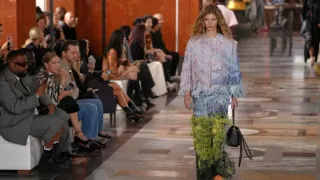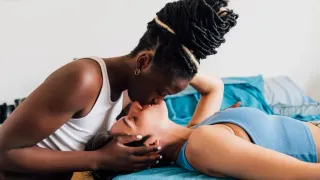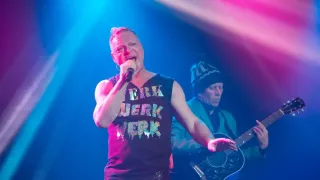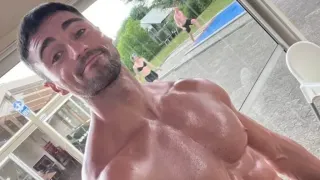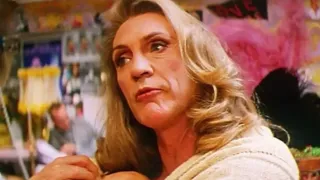September 5, 2015
Queer Comics on the (Straight Dominated) Stand-up Scene
Andre Torrez READ TIME: 5 MIN.
No matter how many pussy jokes he told on stage during the early days of his stand-up comedy act, Sampson McCormick's fabricated material didn't make him any less gay. Black and closeted, the truth was he was living a lie. Beyond the typical down-low discretion for sexual encounters and rather than engaging in potentially painful dates with beards, he chose to cater to hetero-male humor in a very public way.
He's been in the industry roughly 15 years, and while his personal evolution has finally allowed him the courage to accept himself; over the phone he says he mostly plays to "mainstream" rooms where women, people of color and those who identify as LGBTQ still remain grossly underrepresented.
"Socially, gay may seem to be in, but you'd never believe how many doors still get slammed in our faces," he wrote in a press release. He'll be tackling the diversity issue head on, September 8 when he joins forces with Karen Ripley and Ash Fisher, two of his allies to round out an all-queer, predominantly female bill with him being at least one person of color. He organized the show for San Francisco's Punch Line called, My Spirit Animal Is a Butch Lesbian.
"Coming out is different for people. I had several doors to walk out of. You have to come out for yourself," he says, referring to his closet as a "serious walk-in." He was initially outed to his mother who, despite this news, would say things like, "When are you going to bring a little lady home?" He was committed to praying his gayness away.
The fact that her son wasn't straight didn't seem to sink in until she overheard him say, "I love you" to his boyfriend at the time over the phone. This was about ten years ago when he was living in Washington D.C. The boyfriend ended up not working out when he found religion and, in scandalous fashion, began sleeping with the pastor. For McCormick, this only "reiterated the hypocrisy of the church."
Now based out of Oakland, his personal trials prefaced a time of increasing visibility for LGBTQ people in media, perhaps most noticeably in TV shows like "Transparent" and "Orange Is The New Black" that deal with transgender issues. Additionally, Caitlyn Jenner's sudden thrust into the limelight as a default (arguably unqualified) spokesperson for trans awareness -- whether she wants it or not -- are bellwether signs that things are improving.
Sampson McCormick at an event with Cambridge, Massachusetts high school students.
During the Obama administration, we've seen the repeal of Don't Ask Don't Tell, the Defense of Marriage Act, and the subsequent federal legalization of gay marriage with a motion to allow trans people to openly serve in the military on the horizon. The president has given shoutouts to the community in more than a few high-profile speeches.
In an observation true to comedic form, McCormick compares America's treatment of gay people throughout history to "the crazy family member who lives up in the attic" but has now been let out. "Uncle Pete is pretty cool after all," he jokes.
For all the progress that's been made on that front in a relatively short span of time, the reality of police shootings against unarmed black men, instances of law enforcement brutalizing or harassing people of color like Sandra Bland, and polarizing politicians including leading Republican presidential candidate Donald Trump, whose campaign for the upcoming election includes racist concepts of immigration reform, rears its ugly head.
"It's a political time right now with Black Lives Matter. I'm sounding more preachy on stage," says McCormick. "In between writing and doing admin work, I'm reading the news. Sometimes it does sound like a sermon."
He adds, "If you're on the margins, you need to be an activist. I use anything I have. Use art for activism."
Meanwhile, on the small screen, black men have found prominent time slots on networks like Comedy Central with The Nightly Show With Larry Wilmore, and Trevor Noah is set to take Jon Stewart's empty seat on "The Daily Show" in September.
However, in mainstream stand-up comedy, those types of opportunities for minority groups seem virtually non-existent.
"I'm not one to throw out the race card," McCormick says. "My family said you can defy the odds and succeed no matter who you are."
Hella Gay Funny
Ash Fisher, a relative newcomer on the scene who produced the 2014 Hella Gay Comedy Festival in Oakland, says social justice and the queer movement are becoming more mainstream, but that unfortunately, the unwritten rule seems to be that comedy shows need at least one woman or one token person of color on the bill.
"I prioritize booking people of color, people who are trans and women, says Fisher. "Being a woman is my biggest obstacle. By just being queer you're an automatic representative of the community. It's an opportunity to talk about my queerness."
Fisher went on to tell a story of a male emcee introducing her to the audience, but he forgot her name completely. She talked about the pressure to laugh it off because she didn't want to be labeled the "angry dyke comic." In any event, she came out on stage to do her act, nameless, queer and marginalized.
Karen Ripley, who's been in the game longer than the other two combined, emerged in San Francisco in 1977. She described a different era.
"I came on the scene when more and more events wanted to include people of color," she said. "I was turned down for several gigs because of that. The '90s was about leveling the playing field. The main obstacle was getting enough gigs that paid well. I did not pursue straight comedy clubs," she said.
So what is straight humor, and can a generalization like this be as dangerous as the same stereotypes used against those victims of marginalization -and often times the same stereotypes- comedians rely on in their stand-up acts?
Ripley mentions a straight male comedian who tells an abortion joke that he describes as insensitive.
"He works every weekend," she said. "Gay comics? There aren't that many that are out there working the circuit and we get told, 'You can't talk about that.'"
Ash touches on similar misogynistic themes, saying she hates when men make rape jokes.
"Generally, I don't think men should. Women could work through it with comedy. I agree with Joan [Rivers]; comedy can be healing."
The late Rivers, legendary for being unapologetic and not at all PC, once explained in her documentary film, A Piece of Work, how even her husband's suicide was not off limits as far as stage fodder goes, and that we need laughter to work through these types of sensitive situations.
In most cases, what makes comedy work is that there's a truth to what's being said. There wasn't a ring of truth to McCormick's imagined intimacies with the female vagina, but I'm sure he's much better off advising the Saturday Night Live writers, who recently reached out to him to pick his brain about sensitive ways to write jokes that relate to the gay and transgender community.
Sampson McCormick performs 'My Spirit Animal is a Butch Lesbian,' his witty take on homophobia, racism and cultural oddities. Karen Ripley and Ash Fisher also perform. Tuesday, September 8 at 8pm. The Punch Line Comedy Club, 444 Battery St. 397-7573. $15 (2-drink min.). www.sampsoncomedy.com www.karenripley.com www.ashfisherhaha.com www.punchlinecomedyclub.com
